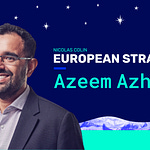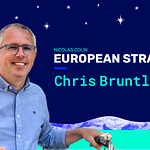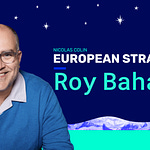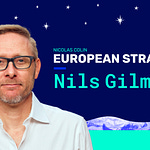The Agenda 👇
I spoke with Lillian Li, writer at Chinese Characteristics, about everything Chinese tech 🎧
What if Daniel Ek buys Arsenal? My latest column in Sifted
Bill Janeway’s insights about balancing power between founders and investors
Curating a comprehensive reading list about founder control in a company
We all have something to say about the football Super League. A thread.
Today’s episode ofBuilding Bridges is my conversation with Lillian Li, a former venture capitalist in Europe who now writes the highly successful newsletter Chinese Characteristics.
I’m not really sure how our paths initially crossed, but I discovered Lillian’s work about technology in China in the course of last year—first on Twitter, and then through the insightful and enlightening essays on Chinese tech companies published on her acclaimed newsletter Chinese Characteristics.
I had all the reasons to dive in. I think China is a critical area on the global map, one that none of us can afford to ignore. And I think that tech entrepreneurship is one of the things that make China matter even more. On the other hand, we Westerners have to be humble when it comes to China: it’s a very large and diverse country, with a culture that’s very different from ours, and where people speak a language that’s extremely difficult for most of us to master.
Needless to say I had to have Lillian on the podcast: as someone who grew up and worked in Europe, she can relate to the kinds of questions we’re facing on this side of the world; but as a native of China who went back there last year, she has the unique ability to share the details and nuances that elude most of us who are seeking to understand how China is positioning in the Entrepreneurial Age.
Here are the topics Lillian and I covered in our 45-min. conversation:
Why she decided to go back to China, how life in China compares to that in the UK in the context of the pandemic, and her assessment of China’s economic prospects.
What makes tech entrepreneurship in China different from that in the US or Europe, and what European entrepreneurs can learn from their Chinese counterparts.
Why Westerners should focus less on powerful Chinese individuals and more on systems and institutions if they really want to understand what’s happening in China.
What really happened in the runup to Ant Financial’s interrupted IPO and her explanation of the setbacks encountered by Jack Ma following the fateful speech he made in October 2020.
The sources she recommends for all who want to learn more, including Rui Ma’s podcast Tech Buzz China and the book China's Economy: What Everyone Needs to Know by Arthur R. Kroeber.
👉 Listen to my conversation with Lillian in the latest episode of the Building Bridges podcast using the player above 👆 or on Apple Podcasts or Spotify 🎧
⚠️ In my latest Sifted column, I’m taking on a story that many people have commented on during the past week or so: the football Super League.
The angle I explore is an interesting development following the disastrous announcement and ditching of the plan after only 48 hours: the fact that Spotify CEO Daniel Ek is now looking to buy the famed Arsenal club in London (which I’m familiar with because I used to live not far from there in the Borough of Islington).
It’s a development that, in my eyes, could signal European tech having reached a new level. It could also contribute to several positive developments in the European tech ecosystem over the coming years.
👉 Read it all in Sifted: Would Daniel Ek buying Arsenal be a game changer for European tech?
⚖️ Bill Janeway on Who Should Be in Control
One of the joys of writing this newsletter is that it gives many occasions to hear feedback and enter discussions with people whom I greatly admire. And Bill Janeway certainly fits into that category, which is why I was happy to have his pushback on my position that it’s a good thing when founders can keep control over their companies. Even better: he agreed to let me share his thoughts with you.
So this edition, which I sent for free to everyone, is simply the text of Bill’s responses during the conversation that we recently had. It’s well worth your time: not only does it provide a crystal-clear understanding of how a venture capital investor can evaluate the developments and various risks occurring in their portfolio, it’s also rich in sources and examples that go deeper into the subject.
I’d also note, before sending you to read the whole piece, that Bill is a great example of the insight one can get from an investor who has developed clear theses on the world in which they’re living. The mantras that he’s developed, such as “corporate happiness is positive cash flow” and “all entrepreneurs lie”, are direct and revealing, serving as useful signposts while evaluating a given situation.
👉 I stepped back to give Bill’s thoughts center stage in Bill Janeway on Who Should Be in Control.


💪 All About Founders Being in Control
My conversation with Bill has obviously been at the top of my mind, and so for the week’s curated readings I went back into everything related to founder control. As Bill also pointed out, there’s nothing particularly new in this debate, as evidenced by one of my earliest writings on the topic (in 2016), which focused on the case of young entrepreneurs back in the 1950s.
And perhaps the continued existence of the debate is simply an indication of how complicated the question is. Indeed, it’s a topic that touches on a wide variety of issues, ranging from the search for product-market fit to crossing the chasm to building a company in the face of both risk and uncertainty.
For entrepreneurs who are still in the early stages of building their company, it’s critical to be aware of the tradeoffs that can come with accepting investors into your cap table, and the terms that will govern the involvement of those investors. This is especially true for anyone looking to build a startup across borders, as choices made early on can have outsized impacts on your options further down the road.
👉 Refine your view on the topic using the sources in All About Founders Being in Control.
⚽️ A Thread on the Super League
It’s rare to see such a rapid, high-profile explosion as that which occurred with the ill-fated announcement of a new football “Super League”. There have been numerous articles looking in detail at what happened, but I wanted to put things into a particular perspective that I believe is fundamental to the Entrepreneurial Age: namely, how the people behind the Super League forgot that football was one of the first industries to truly shine a light on the power of the multitude, thanks to the implicit contract clubs form with their fans.
Football clubs have long been able to translate the power of their local fan base into benefits for the club and its owners. What was lost in the planning of the Super League was that those fans also can turn their power against the club itself, particularly in a situation where there seems to be a significant downside for them, given that the existence of the Super League would have rendered meaningless the outcomes of its elite clubs’ matches against their many historic national rivals.
Still, despite football having been early in sealing a compact with its multitude of fans, the sport itself has in many ways remained in the old paradigm of mass production, especially in its fascination for live TV audiences. That’s proving all well and good for now, but I wonder where the tipping point in the football value chain is, and how owners and investors will make money when technology has displaced many of the players upon which the sport relies?
👉 I put my two cents into one of the big business stories lately in A Thread on the Super League.
Sounds interesting? Subscribe to European Straits and let me know what you think!
🏎 Matthias Hilpert, a seasoned tech investor based in Berlin, just launched a book titled Fast Forward to help founders master the discipline of B2B sales. It includes testimonials from two of our portfolio founders, Nicolas Dessaigne of Algolia and Firmin Zocchetto of PayFit. Discover the book here: Fast Forward: Accelerating B2B sales for startups.
🔍 In my latest contribution to The Family’s daily newsletter, I share a few pieces of advice to help founders identify good investors—ones that are decisive and supportive: Only deal with good investors.
🇫🇷 More podcasts with Laetitia on Nouveau Départ (in 🇫🇷)! Check out yesterday’s edition on Après Merkel : une chancelière verte ? as well as last week’s episode on Travailleurs / entreprises : la distance se creuse. Also make sure to give a listen to Laetitia’s conversation with Denis Pennel about the competing interests of consumers and workers: Le consommateur, ennemi du travailleur ?
From Europe Is a Developing Economy (October 2019):
The most interesting trend in global tech these past few years isn’t anything that’s been happening in the US. Rather, it’s the rise of tech companies in China. Like many Westerners, I had long been uninterested in what was happening in Mainland China. I thought it was too far away, too different, and all happening in the impenetrable language that is Mandarin.
But I changed my mind following Alibaba’s IPO in 2014. That moment triggered my interest, leading me to watch The Crocodile in the Yangtze, a movie that tells the story of Alibaba beating eBay on the Chinese market. I then read many books and articles, met many experts, and even had the opportunity to travel there twice: to Shanghai in 2017 and then to Beijing, Wuhan, Shenzhen, and Guangzhou earlier this year with my colleague Emilie Maret. Today, I’d say that the idea of China as a tech superpower has become widely acknowledged. But that doesn’t make the country any less interesting.
All recent editions:
A Thread on the Super League—for subscribers only.
All About Founders Being in Control—for subscribers only.
Bill Janeway on Who Should Be in Control—for everyone.
Productive Disagreements w/ Ian Leslie. Restructuring. Taxation. Velocity in VC.—for everyone.
Velocity in Venture Capital—for subscribers only.
All About Taxation in the Digital Economy—for subscribers only.
Restructuring The Family—for subscribers only.
Around Europe w/ Tyler Cowen. Lobbying. Startups Across Borders. Biden's Global Tax Reform.—for everyone.
European Straits is a 4-email-a-week product, and all essays are subscriber-only (with rare exceptions). Join us!
(Credit: Franz Liszt, Angelus ! Prière Aux Anges Gardiens—extrait du disque Miroirs de Jonas Vitaud, NoMadMusic.)
From Munich, Germany 🇩🇪
Nicolas





















Chinese Tech w/ Lillian Li. Founder Control w/ Bill Janeway. Daniel Ek, Arsenal & the Super League.